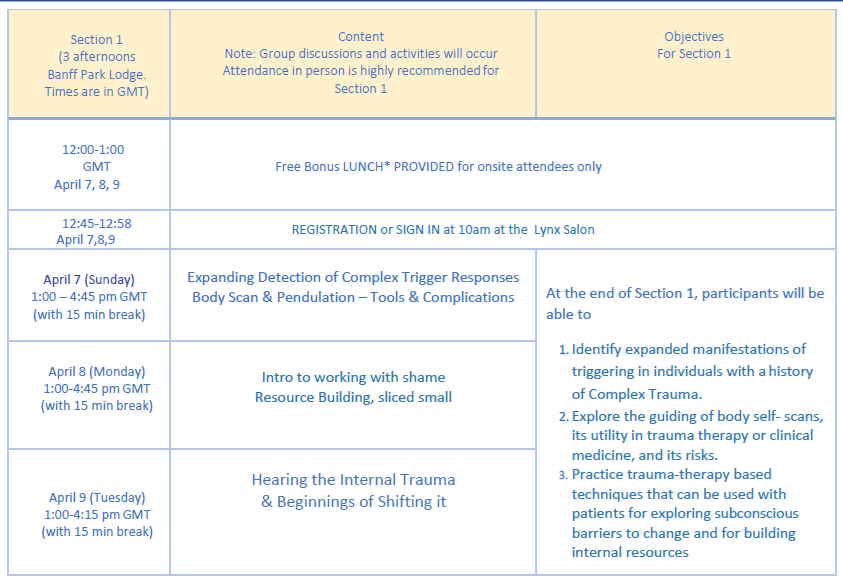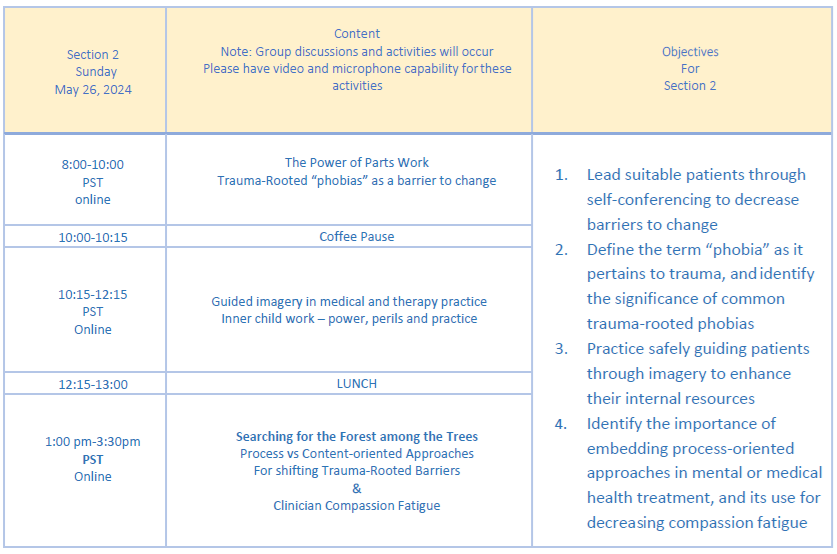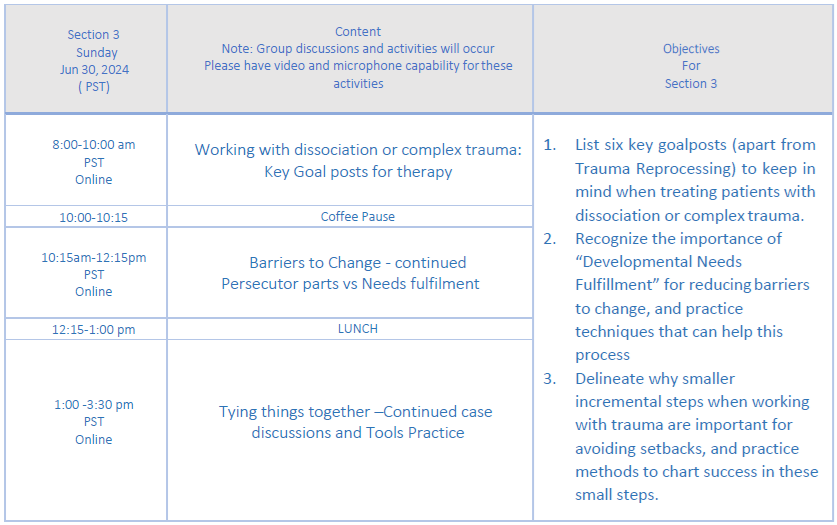Banff & Beyond 102: Advancing Tools & Skills for Responding to Trauma-Rooted Behaviours & Barriers to Healing
Have you ever wondered what trauma therapists actually do with their clients? And what pieces of what they do could we incorporate into our medical or counselling practices? This is another of our highly rated CME courses on healing past trauma that you will not find elsewhere!! This 23 hour course (max. 23 MAINPRO or 23 MOC Section 1 credits) delves into specific hands-on tools used for complex trauma therapy and to tackle some trauma-rooted barriers to change. We also explore ways these techniques and concepts might be applied to medical practice. It is divided into 3 sections: the first is held in person in Banff, Alberta (Banff Park Lodge), and the remainder are online. Previous or concurrent 101 attendance is an asset || Registration ends April 1. Scroll below for reviews, detailed dates, description, agenda, and pricing|| Refund policy: A $350 administration fee will be held for refunds issued. || Only limited spots for registration are available to allow for maximal interactive potential.
- Date:07/04/2024 01:00 PM - 30/06/2024 03:30 PM
- Location Banff Park Lodge for April 7,8,9 2024, then online thereafter (Map)
- More Info:Bonus breakfast and Lunch at Banff Park Lodge for Registrants -
Description
Sample Reviews from Previous Participants:
"I found value in the case based approach to the sessions and the opportunity to develop/practice the skills being taught with co-attendees. Erika layered the learning really well....Thank you! This was an excellent course!" MD
"Building on the foundational knowledge of 101 course, the 102 course takes a practical and relevant approach to case base learning. With good explanation of the why and how to approach a patient who is "stuck" and providing strategies to work with patients to uncover their past and present trauma experience and assist them in a healing process." MD
"Banff and Beyond 102 gave participants a chance to understand first hand what trauma therapy might be like for a patient. Without some understanding of what we are hoping our patients will use to heal, it will be very difficult for us to explain. We may be the connection our patients use to go further into trauma therapy one day. We need to understand what this may look like. Without some experience of this, it will be difficult to get patients to engage and go on." Linda Uyeda, MD, CCFP
"It was extremely valuable to see Dr. Cheng in action when she demonstrated how she might counsel in some challenging circumstances. We got an opportunity to practice some specific and powerful techniques of therapy." MD
Note - This April to Jun 2024 offering will be the last holding of this course before the summer or winter of 2025 at the earliest.
Description of Program:
Trauma-rooted behaviours are often debilitating for individuals and wearing for care providers. In addition, traumatic experiences often lead to brain-based adaptations that paradoxically, may become barriers to healing and recovery. This course (102) builds upon the terminology and skills reviewed in 101, to review a smorgasbord of tools used by many international experts in trauma therapy, through demos and practice activities. Participants are invited to explore how the techniques can be adapted for their own type of practice.
We will also cover more subtle yet common manifestations of complex trauma that are often missed in clinical practice, and yet are frequent barriers to change.
IMPORTANT: Even though we will practice tools used for trauma work, this course is not designed to provide any form of therapy for participants. Registrants are expected to have their own source of counselling/therapy for any trauma issues they may need to heal from. In addition, this course is not designed to qualify anyone to become a therapist. Rather, it aims to introduce registrants to a range of concepts and techniques that are useful in trauma therapy, and can also be used in other clinical scenarios to help identify and shift barriers to change. It also aims to expand registrants’ awareness of key subconscious processes that commonly need shifting in order for patients to fully heal from complex trauma.
NOTE: Participants will be asked to submit a short (Maximum allowed = 1 paragraph) written case (no identifiers allowed) at the start of the course for ongoing small group discussions regarding application of course material.
Participants who attend all sessions, participate in all breakout activities and satisfactorily submit the simple self-reflective assignments will also receive a Certificate of Completion from Beyond the Cycle of Trauma Institute for this course (equivalent to “HCPT 102” in the Institute’s series).
REGISTER TODAY FOR BOTH 101 & 102 to save $200!
This program will not be recorded. Handouts will be emailed to registrants prior to each session.
CME CREDITS: Accreditation/Certification statement
The Division of Continuing Professional Development, University of British Columbia Faculty of Medicine (UBC CPD) is fully accredited by the Continuing Medical Education Accreditation Committee (CACME) to provide CPD credits for physicians. This activity is an Accredited Group Learning Activity (Section 1) as defined by the Maintenance of Certification Program of the Royal College of Physicians and Surgeons of Canada, and approved by UBC CPD. You may claim a maximum of 23 hours (credits are automatically calculated). This one-credit-per-hour Group Learning program meets the certification criteria of the College of Family Physicians of Canada and has been certified by UBC CPD for up to 23 Mainpro+® credits. Each physician should claim only those credits accrued through participation in the activity.
CFPC Session ID: 200003-001
Learning Objectives for the Banff & Beyond 102: By the end of this 23 hour course, participants will be able to:
- Recognize at least two subtle trauma-rooted adaptations that commonly present in medical or psychiatric practice and that pose significant barriers to progress in healing.
- Practice several non-didactic tools that can be used to help shift maladaptive trauma-rooted barriers to healing.
- Assist patients with a history of complex trauma in developing two key internal resources useful for healing from trauma
- Define an array of techniques that trauma therapists may use to help shift unconscious negative internalizations that pose a barrier to healing, and explore how some of these techniques can be simplified and adapted for use in one’s clinical practice.
Agenda and Learning Objectives for Each Section: -- download this: Banff 102 2024 Agenda.pdf



Times and Locations for Each Section of this Course: (*note, the free hot lunch for attendees is a bonus and not part of the registration fee. We will not have the means to provide for any special dietary restrictions. The meal will be pork & shellfish free)
Dates | Times | Location | |
Section 1 | Sun April 7, 2024 Mon Apr 8, 2024 Tues Apr 9, 2024 | 1:00-4:45pm GMT 1:00 -4:45pmGMT 1:00-4:15 pm GMT | Banff Park Lodge, Banff (On-line streaming if you cannot attend in person) Bonus Free Lunch* for Apr 7,8,9 for registrants who attend in person |
Section 2 (6.5 hours) | Sunday May 26, 2024 | 8:00-12:15 PST 1:00-3:30 PST | ONLINE |
Section 3 (6.5 hours) | Sunday June 30, 2024 | 8:00-12:15 PST 1:00-3:30 PST | ONLINE |